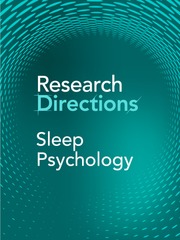Context
The influence of sleep and circadian rhythms on daytime functioning has long been noted. Psychologists and psychology-oriented researchers were among the first to investigate the role of sleep and circadian rhythms in motivation, emotion, cognition, and performance. At the dawn of modern sleep science, psychological fellow, F. B. Dresslar found that telegram tapping speed varied according to time of day providing the first clues to the role of circadian rhythms on performance (Dresslar Reference Dresslar1892). Marie de Manacéïne was the first to experimentally demonstrate that sleep was critical to life and that the brain and behaviour were adversely impacted by sleep loss (de Manacéïne Reference de Manacéïne1894) Patrick and Gilbert elaborated on the role of sleep on psychological functioning and were the first to experimentally study the impact of sleep loss in humans (Patrick and Gilbert Reference Patrick and Gilbert1896). The past century has seen an explosion of interest in understanding which aspects of sleep and circadian rhythms relate to which aspects of daytime psychological functioning.
Advancements in understanding the role of sleep in daytime functioning include sleep-dependent memory consolidation (Stickgold Reference Stickgold2005), sleep as a predictor of daytime mood (Simor et al. Reference Simor, Krietsch, Köteles and McCrae2015), and sleep’s role in daytime accidents (Horne and Reyner Reference Horne and Reyner1999). The mechanisms of the associations among sleep and circadian rhythms and psychological functioning are only now coming to light to the degree necessary to increase, “the capacity for performance during the hours of wakefulness that one seeks to achieve by the proper kind of sleep” (Kleitman Reference Kleitman1963).
Several gaps remain in understanding our overarching question, “What role do sleep and circadian rhythms play in psychological functioning including motivation, emotion, cognition, and performance?” Submissions to this question will help advance our understanding so that human health, experience, and performance can be optimized. Specific topic areas of interest to this question include, but are not limited to:
-
Research on the role of sleep and circadian disturbance on mental health and mood more generally
-
Research that uses interventions to treat sleep disturbances to explore mechanisms through which sleep health impacts emotion, behaviour, and cognition
-
Research that integrates sleep science into cognitive and affective neuroscience
-
Research aimed at determining the mechanisms underlying the anti-depressant effect of sleep deprivation
-
Somnoimaging studies on how regional brain activity patterns during sleep relate to daytime functioning memory.
-
Research that utilizes sleep deprivation, restriction, or sleep and circadian disruption to understand the fundamental mechanisms of insomnia and its effects on daytime function.
-
Research on the mechanisms linking sleep and circadian rhythms to cognitive functioning, particularly in older adults
-
Investigations of day-to-day associations among sleep and mood, cognition, and physical performance
-
Ecological research on sleep and circadian patterns on school, work, and sports performance
-
Epidemiological research examining the associations among sleep and circadian rhythms and psychological factors at the population level (with particular interest in investigations examining potential disparities)
-
Neural mechanisms underlying compensatory mechanisms that prevent sleep and circadian rhythms from impacting daytime functioning
-
The impact of sleep and circadian rhythms on health-related decision making
-
The role of sleep and circadian rhythms on daytime safety (i.e., decision making, car crashes, work accidents)
How to contribute to this Question
If you believe you can contribute to answering this Question with your research outputs find out how to submit in the Instructions for authors. This journal publishes Results, Analyses, Impact papers and additional content such as preprints and “grey literature”. Questions will be closed when the editors agree that enough has been published to answer the Question so before submitting, check if this is still an active Question. If it is closed, another relevant Question may be currently open, so do review all the open Questions in your field. For any further queries check the information pages or contact this email [email protected].
Acknowledgments
We acknowledge Eva Lundgreen for her editorial review of formatting and grammar.
Competing interests
The authors declare none.




